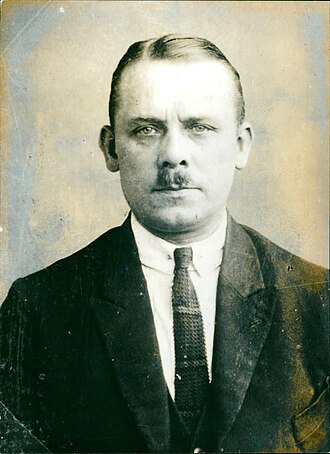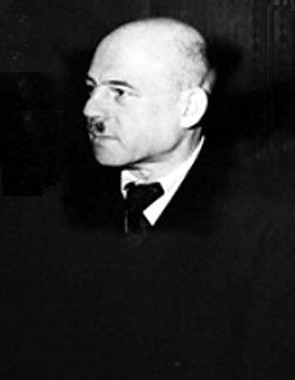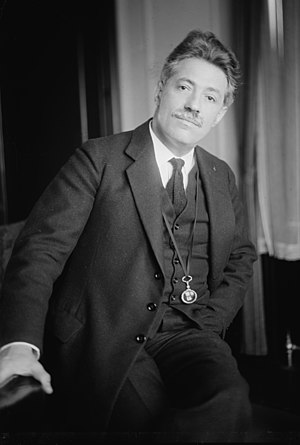Discover Your Roots
SIGN UPDiscover Your Roots
SIGN UPFritz is a male name of German origin meaning "Peace Ruler." It originated as a diminutive of Friedrich or Frederick, commonly associated with King Frederick II of Prussia and Frederick III, German Emperor. The name also has connections to similar names like Fridolin and Francis. Fritz has been used as a surname in various notable individuals, including politicians, athletes, and artists. Additionally, it has been a given name for influential figures such as Fritz Haber, a renowned chemist and Nobel Prize winner, as well as fictional characters like Fritz the Cat and Fritz Von Trapp from "The Sound of Music." The name has also been used as a nickname or code name for prominent personalities and fictional characters. Overall, Fritz carries a strong and meaningful significance as a name associated with peace and leadership.

Fritz Lang, born Friedrich Christian Anton Lang, was a renowned Austrian-born film director, screenwriter, and producer known for his work in Germany and the United States. An influential figure in the film industry, Lang was dubbed the "Master of Darkness" for his contributions to the Expressionist movement. His career spanned five decades, during which he created iconic films such as "Metropolis" (1927), "M" (1931), "Dr. Mabuse the Gambler" (1922), and "The Nibelungen" (1924). After relocating to Hollywood in 1934, Lang continued to produce notable works, including "Fury" (1936), "The Woman in the Window" (1944), and "The Big Heat" (1953). Lang's impact on cinema earned him recognition as one of the most influential filmmakers of all time.Born in Vienna in 1890, Lang's early life was marked by diverse experiences, including studying civil engineering and art, as well as serving in the Imperial Austrian Army during World War I. He began his career as a writer at Decla Film and later transitioned to directing, collaborating with writer Thea von Harbou on several films. Lang's contributions to film history continue to be celebrated, cementing his legacy as a visionary in the art of storytelling through cinema.

Fritz Haarmann, also known as the Butcher of Hanover, was a notorious German serial rapist and killer who terrorized the city of Hanover between 1918 and 1924. He was responsible for the sexual assault, murder, and dismemberment of at least twenty-four young men and boys. His gruesome actions earned him titles such as the Vampire of Hanover and the Wolf Man due to his preferred method of biting into his victims' throats. Haarmann's troubled upbringing and troubled family dynamics possibly contributed to his deviant behavior. He had a difficult relationship with his authoritarian father and developed an effeminate nature, which resulted in him being ostracized by his peers. Haarmann's criminal activities began in his adolescence, and he was eventually placed in a mental institution after being deemed "incurably deranged." Despite escaping and living abroad for a period, he returned to Hanover and continued his criminal activities. Haarmann's life ended tragically when he was sentenced to death and executed by guillotine in 1925. His chilling crimes and the details of his upbringing have continued to captivate and horrify people to this day.

Fritz Alphonse Jean is a prominent Haitian economist, politician, and writer. He has held various significant roles throughout his career, including serving as the governor of the Banque de la République d'Haïti and being elected as the Provisional President of Haiti in 2022. Jean's early life was rooted in Cap-Haïtien, and he pursued his education in economics and mathematics in the United States before returning to Haiti to embark on his professional journey. He has been actively involved in academia, economic consulting, and leadership positions within the public and private sectors of Haiti. Fluent in Haitian Creole, French, and English, Jean is also a founding member of the Haitian Stock Exchange. Furthermore, he has contributed to literature with notable works such as "Haiti – the end of an economic history" and "Amethys – open wounds." With his diverse expertise and extensive contributions, Fritz Alphonse Jean continues to play a significant role in shaping Haiti's economic and political landscape.

Ernst Friedrich Christoph "Fritz" Sauckel, born on October 27, 1894, was a prominent figure in German history. He held various influential positions within the Nazi regime, including Gauleiter of Gau Thuringia and the General Plenipotentiary for Labour Deployment during the Second World War. Sauckel's involvement in the Nazi Party led to his trial at the Nuremberg Trials, where he was found guilty of war crimes and crimes against humanity. His early years were marked by a diverse range of experiences, including maritime service and internment during World War I. Sauckel's political career began when he joined the Nazi Party and became a key figure in Thuringia, serving as a member of the Landtag and later as the Reichsstatthalter of Thuringia. His close ties to Adolf Hitler and significant roles in the Nazi government solidified his status as an "old fighter" within the party. Sauckel's complex and controversial legacy continues to be a subject of historical study and debate.

Friedrich "Fritz" Kreisler (February 2, 1875 – January 29, 1962) was a distinguished Austrian-born American violinist and composer known for his sweet tone and expressive phrasing. He studied at prestigious music institutions and made his United States debut in 1888, gaining acclaim through his remarkable performances. Kreisler's career saw him giving concerts worldwide, premiering renowned works, and settling in the United States during World War II. His marriage to Harriet Lies, a Vassar graduate, lasted 60 years until his passing. Kreisler's legacy includes a collection of compositions for the violin, such as "Liebesleid" and "Liebesfreud," as well as operettas and cadenzas for renowned concertos. He also wrote the music for the 1936 movie The King Steps Out. Additionally, Kreisler was a collector of antique violins made by famous luthiers. His impact on the world of music endures through his influential performances and enduring compositions.
All images displayed on this page are sourced from Wikipedia or Wikimedia Commons.We use these images under their respective Creative Commons or public domain licenses. Wherever applicable, author attributions and license information are provided. If you believe an image is used incorrectly or outside its license terms, please contact us so that we can review and correct the issue.